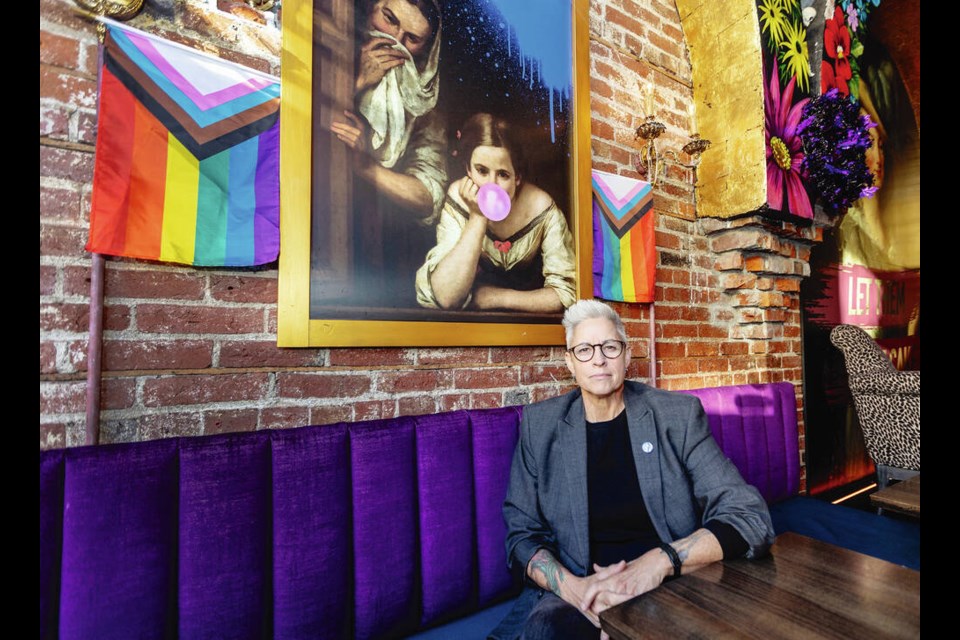For the first time in years, Victoria no longer has a nightclub that explicitly markets itself for the LGBTQ+ community.
While some might see it as a sign of growing progress and inclusivity, others say there is still a need for safe spaces for the queer community to dance the night away.
In a recent incident that hit social media, Bucky Yaqub, a visitor from Surrey, went to what he thought was a gay nightclub on Broad Street one weekend last month.
Yaqub greeted those near the entrance with a campy salutation of “Hi gays!” but instead of the friendly response he was expecting, he said he received a stream of homophobic slurs from a patron who had stepped out of the Paparazzi nightclub for a smoke.
Yaqub, who has neon-blue hair and dresses flamboyantly, said that it was hate speech aimed at a seemingly easy target. “I don’t present as someone that’s going to bark back and stand up for myself.”
Yaqub said he yelled for security to intervene, but was asked to leave the area and contact police instead.
After sharing his experience on social media, Yaqub received a flood of private messages from other people in the LGBTQ+ community who have had similarly negative experiences, he said. “That shocked me, because I was like, ‘OK, so it’s not a singular thing.’ ”
The club has issued a statement since saying that Paparazzi has zero tolerance for any form of harassment or discrimination, and that the “security, safety, and comfort of our guests is paramount.”
Paparazzi told the Times Colonist that the club followed up with police and took the incident seriously, even though security did not witness the interaction between Yaqub and the other man. “We have no reason to doubt Bucky’s allegation,” the club said in a statement.
The club’s social media accounts were later locked down in response to online backlash stemming from the incident.
Ace Mann, a co-president of the Victoria Pride Society, said that what Yaqub experienced that night matches up to what they have been hearing from Victoria’s LGBTQ+ community.
“We encourage any community member to only go to places that make them feel safe — and if that includes Paparazzi, then we’re really happy for them,” said Mann.
But Mann, who goes by they/them pronouns, said they would personally not consider the nightclub a queer-safe space.
The nightclub has undergone a quiet rebrand in recent years and has not been an official Pride parade participant since the start of the pandemic, they said, adding it had not always been that way. “It’s been really sad to see a place that we really thought was for us, not be for us.”
Clubs often change names and owners, but the nightclub on Broad street has catered to the LGBTQ+ community for at least 30 years, whether it was called BJ’s, Prism Lounge or Paparazzi.
Before that, there was Rumors Cabaret at 1325 Government St., which proudly hung a sign at its entrance proclaiming its status as a gay bar, even during less-accepting times.
In past years, the start of Pride festivities in Victoria was typically marked with a masquerade party at Paparazzi — which then marketed itself as a straight-friendly alternative space.
The nightclub regularly hosted events oriented toward the LGBTQ+ community, such as the now-defunct Mr. and Miss Gay Vancouver Island Pageant.
In June, drag-show producer Shelita Cox announced the end of a five-and-a-half year residency at the venue, saying that the Drag Sunday event “had run its course.”
In a video statement released before her last show at Paparazzi, Cox alluded to multiple contributing factors, including burnout.
Paparazzi said it still welcomes drag-show producers at its establishment should they choose to use the venue. “Our business is inclusive of all persons and we pride ourselves that we are an inclusive space for the LGBTQIA2S+ community.”
The city still has bars and other businesses that support and even cater specifically to the LGBTQ+ community.
“We do have places that are beautiful, above-ground like [Friends of] Dorothy and Vicious Poodle and places in Vancouver that didn’t exist even a couple of decades ago,” said Chris Vautour, a Victoria-based filmmaker who has been working on a documentary about an underground lesbian bar in Cambridge, Ont.
But they’re not exactly venues for dancing.
Vautour said she had fun the last time she went to Paparazzi, where she was reunited with the plastic plant in the corner with its two inches of dust, seemingly untouched since the 1990s, when she was a regular.
But the demographics in the nightclub had shifted to university students who looked like they were drinking for the first time, she said.
“I wasn’t entirely convinced they were gay,” she said with a chuckle.
Vautour said she prefers to take to the dance floor when the occasion is specifically for the lesbian community, but those events are few and far between. “Occasionally, Queer As Funk will come and that’s sort of when dancing can happen, but when is that, once every year or two? And that’s a live event, not a club.”
The nightclub and gay bars hold a special place in LGBTQ+ history, she said. “Now, a young gay person has so many more avenues — and healthier avenues —than just drinking, dancing, and smoking. But that was all we had back then. That was everything, our internet, our community centre.
“It was the only space that gays could find each other.”
Kara Stanton, editor of Dyke News, a lesbian-focused print newsletter in Victoria, said there’s still a need for community spaces where people can dance and hold events without having to pay for a sit-down meal or an expensive cocktail.
“There definitely is still a sense of queer and trans folks, and especially queer and trans folks of colour, looking carefully for where they can gather safely.”
Yaqub had the same question as well. “If people don’t feel safe here, where do they go?”



